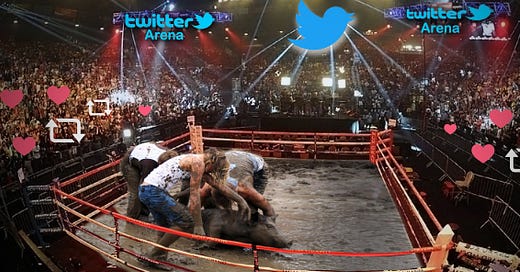“On surrounded ground, make plans. On dying ground, fight. On bad ground, keep going.”
- Sun Tzu
The hashtag #leavingtwitter started trending this week in the wake of news that the platform is being sold to a private party. Many users don’t believe (for evidence-based reasons) the new owner will work to prevent the types of content that makes social media miserable, and fear that free speech on the platform will be limited to only the loudest, least nuanced, and most extreme users. The reasons for #leavingtwitter are multi-fold, but they generally boil down to concerns that problems like disinformation and harassment campaigns will continue unchecked.

Many users have indeed, already left, many more only threatened to leave. Others though, promised to “stay and fight”. To spread truth on Twitter when they see misinformation, and to fight for their values. But that sentiment expresses two very key errors in logic:
Fallacy 1: Twitter was worth fighting on before, and a change in ownership will change that.
Twitter’s business model has never relied on conveying truth, understanding, education, lowered anxiety, problem solving, nuanced opinion, etc. etc. etc. Not only is Twitter not a place to find any of those things, it’s financially incentivized to de-prioritize them within it’s walls.
Twitter’s business model is to serve ads1. More scrolling means more ads seen. More fighting means more scrolling. Yes, it’s that simple. All social media capitalizes on humanity’s need to feel seen and to feel heard, all social media monetizes your attention. Twitter is no different and it never has been. The bickering, the hot takes, the dramatic outrage; they might not be by design per-se, but they are certainly foundational.
Fallacy 2: Fighting on Twitter can help the cause one is fighting for.
second error is that the notion that “staying to fight” would be somehow aiding the stayer’s desired cause. It won’t. It actually can’t. Fighting on Twitter not only feeds the beast, but the way Twitter’s system is designed, actually makes a victory for nuanced intelligent debate impossible. Consider these three propositions:
The “fight” is what Twitter profits from and what it exists to create.
A nuanced perspective cannot take root a system like Twitter’s, that prioritizes short, “hot” takes.
More extremist positions can only stand to gain validity from sparring with more nuanced ones.
Therefore: fighting on Twitter at best does little more than raise money for Twitter, and at worst gives validity and attention to the position the arguer is arguing against. It can be so tempting to correct someone for the crime of being wrong on the internet. But ask yourself what you and society would gain by indulging in the emotional response which is fueling this platform.

Debating on Twitter is like wrestling with a pig at a casino. You’ll get dirty, the pig will love it, and all the while the house will profit.
“Bad ground”
The ancient Chinese strategist and philosopher Sun Tzu would characterize the battlefield terrain of social media as “bad ground”; which is terrain that “offers no stability to fortify a solid position”. In Twitter’s arena, the deep foundations required for nuanced, intelligent debate are rendered useless against the slings and arrows of outrageous takes.
Bad ground provides no advantages and should be vacated quickly. On bad ground, I would urge my troops onward. - Sun Tzu
Sun Tzu’s phrasing here is important: It isn’t specifically retreat he is suggesting, but movement onward. The priority lies first in getting off of the “bad ground”.
It should go without saying that most of the ideas expressed in this essay apply to all the large social media companies. These platforms plainly just not constructed to serve the purposes they often claim to be. When one looks at social media (and particularly Twitter) they’ll see a lot of people that care very deeply about many topics. It’s important to care; it’s important to keep cynicism at bay and to fight good fights. But it’s also important to evacuate “bad ground” before choosing your battles.
Twitter isn’t a “town square” where neighbors connect, share news, and constructively debate what’s best for their community. It’s not a “marketplace of ideas”. It’s a mud-wrestling pig pit at a casino. And you don’t have to play their game.
And user data, but for simplicity’s sake we’re focusing on ads.





